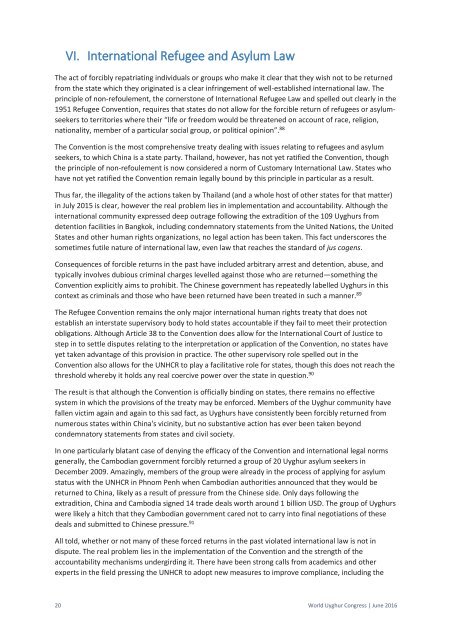Create successful ePaper yourself
Turn your PDF publications into a flip-book with our unique Google optimized e-Paper software.
VI. International Refugee and Asylum Law<br />
The act of forcibly repatriating individuals or groups who make it clear that they wish not to be returned<br />
from the state which they originated is a clear infringement of well-established international law. The<br />
principle of non-refoulement, the cornerstone of International Refugee Law and spelled out clearly in the<br />
1951 Refugee Convention, requires that states do not allow for the forcible return of refugees or asylumseekes<br />
to teitoies hee thei life o feedo ould e theateed o aout of ae, eligio,<br />
nationality, member of a particular social group, or politial opiio. 88<br />
The Convention is the most comprehensive treaty dealing with issues relating to refugees and asylum<br />
seekers, to which China is a state party. Thailand, however, has not yet ratified the Convention, though<br />
the principle of non-refoulement is now considered a norm of Customary International Law. States who<br />
have not yet ratified the Convention remain legally bound by this principle in particular as a result.<br />
Thus far, the illegality of the actions taken by Thailand (and a whole host of other states for that matter)<br />
in July 2015 is clear, however the real problem lies in implementation and accountability. Although the<br />
international community expressed deep outrage following the extradition of the 109 Uyghurs from<br />
detention facilities in Bangkok, including condemnatory statements from the United Nations, the United<br />
States and other human rights organizations, no legal action has been taken. This fact underscores the<br />
sometimes futile nature of international law, even law that reaches the standard of jus cogens.<br />
Consequences of forcible returns in the past have included arbitrary arrest and detention, abuse, and<br />
typically involves dubious criminal charges levelled against those who are returned—something the<br />
Convention explicitly aims to prohibit. The Chinese government has repeatedly labelled Uyghurs in this<br />
context as criminals and those who have been returned have been treated in such a manner. 89<br />
The Refugee Convention remains the only major international human rights treaty that does not<br />
establish an interstate supervisory body to hold states accountable if they fail to meet their protection<br />
obligations. Although Article 38 to the Convention does allow for the International Court of Justice to<br />
step in to settle disputes relating to the interpretation or application of the Convention, no states have<br />
yet taken advantage of this provision in practice. The other supervisory role spelled out in the<br />
Convention also allows for the UNHCR to play a facilitative role for states, though this does not reach the<br />
threshold whereby it holds any real coercive power over the state in question. 90<br />
The result is that although the Convention is officially binding on states, there remains no effective<br />
system in which the provisions of the treaty may be enforced. Members of the Uyghur community have<br />
fallen victim again and again to this sad fact, as Uyghurs have consistently been forcibly returned from<br />
numerous states within China's vicinity, but no substantive action has ever been taken beyond<br />
condemnatory statements from states and civil society.<br />
In one particularly blatant case of denying the efficacy of the Convention and international legal norms<br />
generally, the Cambodian government forcibly returned a group of 20 Uyghur asylum seekers in<br />
December 2009. Amazingly, members of the group were already in the process of applying for asylum<br />
status with the UNHCR in Phnom Penh when Cambodian authorities announced that they would be<br />
returned to China, likely as a result of pressure from the Chinese side. Only days following the<br />
extradition, China and Cambodia signed 14 trade deals worth around 1 billion USD. The group of Uyghurs<br />
were likely a hitch that they Cambodian government cared not to carry into final negotiations of these<br />
deals and submitted to Chinese pressure. 91<br />
All told, whether or not many of these forced returns in the past violated international law is not in<br />
dispute. The real problem lies in the implementation of the Convention and the strength of the<br />
accountability mechanisms undergirding it. There have been strong calls from academics and other<br />
experts in the field pressing the UNHCR to adopt new measures to improve compliance, including the<br />
20 World Uyghur Congress | June 2016


